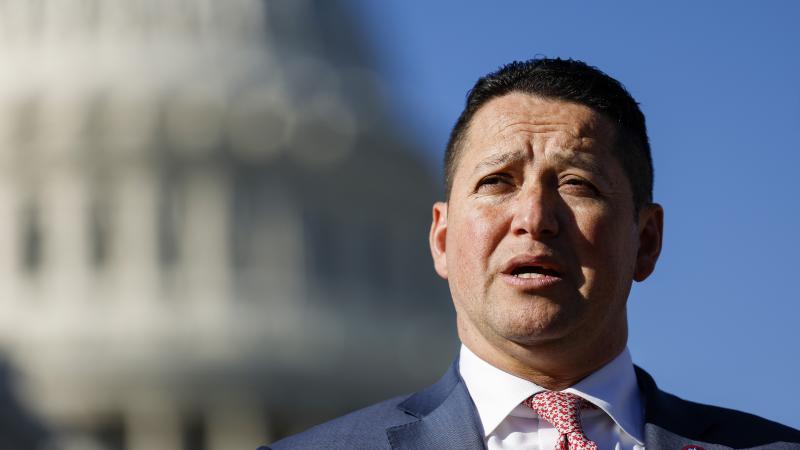Government shutdown? Republicans clash over spending bill, want to ban federal weaponization
"The reality is we're headed to a shutdown here unless we can get something together and hold these Democrats' feet to the fire," Rep. Brian Babin said.
Congressional Republicans seek to use appropriations bills to end what many call "the weaponization of the federal government" as they clash over a spending measure that could lead to a government shutdown.
Some House Republicans are seeking to pass a continuing resolution for the federal budget to prevent a government shutdown on Oct. 1, as members from both the House Freedom Caucus and Main Street Caucus negotiated a proposal to reduce discretionary spending by 8%.
According to the continuing resolution, which would fund the federal government until Oct. 31, there would be an 8.1285% reduction in discretionary spending, specifically for all the federal agencies except the Department of Defense and Department of Veterans Affairs departments.
In June, a debt limit deal became law with provisions that if all 12 appropriations bills are not passed by Jan. 1, 2024, then there would be a 1% cut to the federal budget. The House has passed one bill but none have passed the Senate.
Rep. Bryan Steil (R-Wis.), chairman of the Administration Committee, told the “Just the News, No Noise” TV show on Monday that he believes the appropriations bills can be used to limit the politicization of the federal government.
There “is a huge opportunity on the appropriations bills coming before us to actually put forward conservative policies that make sure that we're having every federal agency, including the Department of Justice, doing their job and not drifting into other political realms,” Steil said.
“And so, as we have this big spending fight in Washington over the coming two weeks, I think it's essential that we get our spending bills done, that we're not living under Nancy Pelosi and Democratic one-party control spending bills and their priorities. We have conservative policies at the helm to make sure that our federal agencies are doing the people's work, not politicians’ work,” he continued.
Republicans have repeatedly said that there are two tiers of justice in the U.S., particularly in instances such as when former President Donald Trump was investigated by the Justice Department for alleged Russian collusion and claiming there was election fraud in 2020 while investigations into Hunter Biden were purposely stalled.
Sen. Marsha Blackburn (R-Tenn.) told the "John Solomon Reports" podcast on Tuesday that Americans are concerned about the disparate treatment.
“People look at this, and they say, ‘Two tiers of justice,’” Blackburn said. “Why is it that you have two tiers of access, two tiers of enforcement, two tiers of compliance, two tiers of justice? And you see this from all your federal agencies, whether it's the EPA, the IRS, DOJ, FBI.”
She added that her constituents have said that they are afraid of the possible consequences of a two-tiered justice system.
Blackburn said that Tennesseans told her last Friday, “The two tiers of justice really frighten us because if they can do certain things to Donald Trump, but then they can turn around and say to the Clintons, to the Bidens and to their cronies, ‘Oh, we’re just going to turn a blind eye to that and let you skate,’ that really concerns people.”
She explained that "it concerns small business owners” because if the government bureaucracy “get[s] their way, they can manipulate what businesses survive and which businesses sink, what people are held to account for wrongdoing and what people are not.”
Rep. Eli Crane (R-Ariz.) told the "John Solomon Reports" podcast on Tuesday that because of the weaponization of the federal government, he has received comments from constituents saying to shut down the government.
“They fear what this government is turning into, and that's why they want a reckoning,” Crane said. “And they know the only way that happens is if we exercise the power of the purse and say, ‘No, we're not going to pay for that anymore. We're actually going to make some cuts in this town, we're going to start turning this thing around.’”
Crane said that he is “not voting for a resolution,” which he sees as a form of “kick[ing] the can down the road.”
Rep. Jim Jordan (R-Ohio) told “Just the News, No Noise” on Tuesday, "[W]e want certain language on these appropriation bills, when we get to those, that says, you know, no money can be used to censor Americans — that kind of language — no money can be used to develop a disinformation governance board at the Department of Homeland Security like they tried to do a year ago."
Jordan added that securing the U.S.-Mexico border should be the main issue with regard to the continuing resolution.
“Let's say no money can be used to process and allow into the country migrants, new migrants into the country,” Jordan said. “And, after all, you got the Democrat mayor in New York saying that we need to do something. Send that kind of bill to Chuck Schumer and see what he does.”
Some Republicans believe the continuing resolution should be passed but acknowledge the hurdles between the GOP caucuses in getting the bill through the House.
Rep. Brian Babin (R-Texas) told “Just the News, No Noise” on Tuesday, “The reality is we're headed to a shutdown here unless we can get something together and hold these Democrats’ feet to the fire — especially President Biden — because, if we don't put our bill on the floor, that means we're going to leave it up to them to put [up] a bill.”
He added, “We need the most conservative bill possible.
“This was one of the most conservative I've seen since I've been serving up here,” Babin noted, saying that he “was amazed that we still can't get to yes and unite.
“We're not going to win this thing by not uniting, we're going to be disjointed. And I certainly hope that they will come around and that we will do the right thing.”
Blackburn said that she sees the continuing resolution as “a giant step forward.”
She also noted, “The House is trying to negotiate their way to a CR. We are encouraging them to reach a deal on a CR and also to pass their appropriations bills, which they should have been doing over the last several months, and sending those to us.”
A group of five House Republicans on Tuesday voted with Democrats to block the advancement of a Pentagon funding measure over the disagreements on the continuing resolution.















